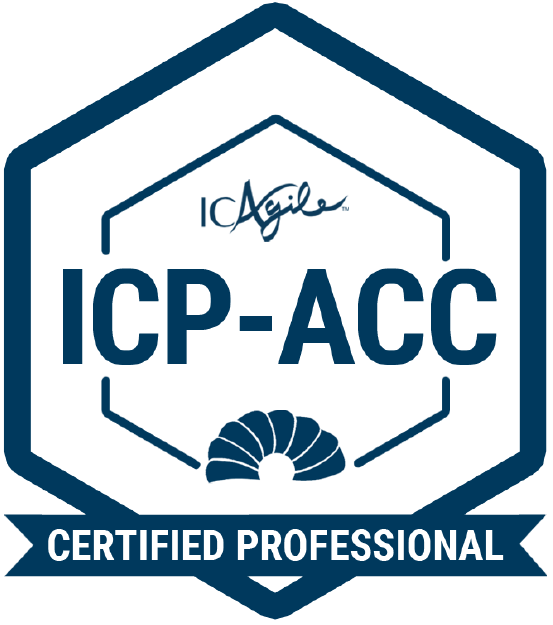Overview
A coach's primary goal is to enhance their client's awareness of practice and behavior — enabling and empowering the client to realize objectives that may be just outside of their reach. Through thoughtful and deliberate engagement, the coach strives to enhance, in a measurable and sustainable fashion, team practices in order to provide focus on the business goals and objectives of the team and organization. Whether the coach is internal or external to the organization, coaching covers a broad spectrum of teaching, mentoring, problem-solving, planning, leadership, team-building, and mastery of skills and knowledge.
Coaches must challenge organizations to change the culture — establishing new paradigms — which permit agile-lean thinking and quickly deliver value. A coach must be competent, professional, and ethical — having business and technical knowledge and an understanding of change and the impact it has on individuals and organizations. This course is designed to teach, practice, and reinforce the core coaching competencies of the Agile coach, enabling the Agile coach to succeed at reaching agreed-upon team and organizational outcomes.
*This course has been approved by ICAgile to award students the Certified Professional in Agile Coaching (ICP-ACC) upon successful completion. The ICP-ACC is also a prerequisite to earning the ICAgile expert in Agile Coaching certification (ICE-AC).

Successfully complete an ICAgile accredited course taught by an ICAgile Authorized Trainer.
ICAgile Authorized Trainers can withhold certifications based on lack of participation or understanding of course learning objectives.
GSA: $1485 USD
21 PDUs
Next Upcoming Course


Train up your teams with private group training
Have a group of 5 or more students? Cprime also provides specialist private training with exclusive discounts for tailored, high-impact learning.
ICAgile Coaching (ICP-ACC) Schedule
Full Course Details
Part 1: The Agile Coach
An Agile Coach is an advanced facilitator of business practice who has achieved an expert level in lean/Agile practices and one or more knowledge domains. Agile Coaches have developed professional coaching, mentoring, and/or training skills and realize that their skill as a coach is developed through working with others and continuously learning about and improving their coaching skill set. To assist you in becoming more proficient in your coaching, you will learn about:
- "Your" definition of Agile coaching
- The Agile coaching mindset
- Defining Agile team facilitation
- Agile team facilitator behaviors
- Assessing one's ability to serve the team
- Responsibilities and skills of the coach
- Achieving self-awareness/self-management in the coach
- Developing more advanced Agile coaching skill
- Setting boundaries for coaching
- Internal vs. external coaches
- Defining the coaching "contract"
- Designing a coaching alliance
Part 2: The Coach as Facilitator
A facilitator is someone who helps a group identify common objectives and then offers group processes to achieve that defined outcome while maintaining neutrality. A skilled facilitator consciously embodies self-awareness, self-management, bias management, while conveying openness and enthusiasm. An Agile Coach facilitates more than meetings. An Agile Coach facilitates participation, collaboration, and engagement from the team and organization. We will discuss and practice:
- Facilitation and the facilitator stance
- Definition of facilitation
- The facilitation of meetings
- Designing meetings for collaboration
- Facilitating full participation and engagement
- Facilitating collaboration
- Facilitating team decision-making
Part 3: The Coach as Professional Coach
Effective Agile coaches know the parameters of their job. They avidly take up their responsibilities and help others take up theirs. They are able to clearly articulate the differences between their role and that of others in the organization such as product owner, project manager, program manager, and functional manager. Agile Coaches are able to communicate their roles and set agreements with their clients to identify what this looks like. Exploring these concepts we will cover:
- The coaching stance
- Maintaining neutrality in coaching
- Self-awareness and self-management
- Holding the client's agenda
- Issue identification and exploration
- Action commitment and achievement
- Professional coaching skills
Part 4: The Coach as Mentor
Successful Agile coaches have learned to not go it alone. They have acquired their skills by calling on the skills and knowledge of mentors. Through being mentored, they learn to mentor others. As a group, we will explore mentorship – the process of formally and informal sharing knowledge via social contracts. Specifically, we will look into:
- Mentoring and coaching the Agile roles
- Mentoring and coaching transitions and practices
- Understanding the individual change cycle
- Identifying and handling resistance from individuals
- Mentoring vs. coaching
Part 5: The Coach as Teacher
The terms coaching and teaching are often used interchangeably referring to the transfer of knowledge or experience and the education of an individual to another. However, a knowledgeable Agile Coach knows that this definition does not always hold true. We will explore the differences between mentoring and coaching versus teaching. You will explore different modes and methods of teaching and when you should switch "modes." We will cover:
- Mentoring and coaching versus teaching
- Teaching the Agile basics and mindset shift
- Modes and methods of teaching
- Distinguishing and articulating Agile frameworks
Part 6: The Team Coach
Successful Agile Coaches are able to diagnose and assess healthy team functioning, including the ability to identify dysfunctional behaviors or circumstances. We will review these patterns and indicators and learn practices and techniques to coach the team through their learning curves toward steadily improved performance. You will learn to coach performance by:
- Understanding team development
- Understanding a model of team development
- Detecting a team's stage of development
- Helping a team move up the development curve
- Setting up the team environment
- Creating team trust
- Learning shared leadership and self-organization
- Continuously seeking to improve
- Defining and identifying high performance
- Knowing and establishing team vs. group mindset/behaviors
- Understanding strategies for dealing with different types of teams
- Understanding your role in the self-organizing team
- Handling conflict and dysfunction within the team
- Identifying and managing 'Group Think'
- Handling organizational impediments
- Promoting leadership engagement
Professionals who may benefit include:
- Project and Program Professionals who aspire to the role of Agile Coach.
- Experienced Scrum Masters, Agile Project/Program Managers, or Iteration Managers who want a more comprehensive understanding of the complete range of business and Agile coaching skills.
- Agile coaches who want to enhance and improve their professional skills as Agilists and professional coaches.
- Coaches who wish to increase the ability to break through seemingly insurmountable problems with their teams.
- Agile managers, Product Owners, and others wishing to access a broader range of skills in working with teams.
- Skilled coaches who wish to polish their skills and learn a few new tricks and techniques.
- Functional managers or Scrum Masters with some experience as an Agile coach, but Agile seems like it is not working for your teams.
- Someone trying to become a Certified Scrum Coach or ICAgile Certified Expert in Agile Coaching.
- Someone coaching or mentoring Agile teams, but you seem to be caught in a rut or just going through the motions and not making progress.
- Define Agile coaching and the set of competencies and practices associated with being a coach.
- Develop ethical and professional coaching standards and agreements and how to apply them in your coaching engagements with teams and organizations.
- Develop "your style" of coaching, facilitating, mentoring, and teaching
- Become a true servant leader; putting the needs of others first to facilitate the development of high-performance teams.
- Adopt Agile Coach thinking – the mindset shift necessary to help you, and others, focus on team improvement, value-driven delivery, and leveraging constraints while living in the present moment, staying curious, innovative, and having fun.
- Establish mutual trust within your organization.
Although there is not an ICAgile official exam, ICAgile allows for their course accreditors to determine appropriate means for retention of the learning outcomes. Depending on your provider, there may be some type of assessment in order to earn certification.
Many providers assess via participation, activity and understanding conveyed via exercises and discussion, withholding certification when appropriate.
The course content was exactly what I needed to further my journey in 'being' Agile
I really liked this course and it made me want to be an agile coach!
I have been offered positions for Agile coaching I feel confident now that I can do this.
The course was very hands-on. This was one of the most interactive courses I had attended in a long time.

I loved the personal experience and thought I got more out of it than any other training course I have ever taken because it required me to pay more attention and to be more accountable.
-Amanda S., Charter Communications